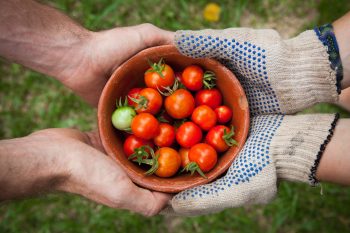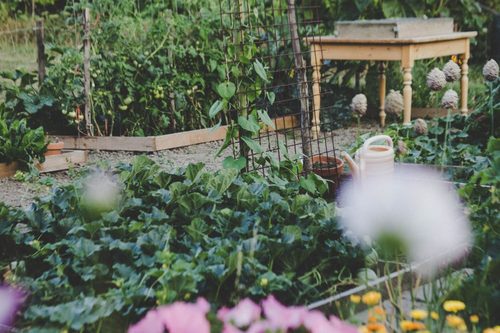If you’re used to eating your greens, there must be tons of seeds you’re disposing of that you can use in your garden.
Certain vegetable varieties prefer to be sown directly into the ground and therefore do not transplant happily. These include all the beans (runner, broad and bush beans), beetroot, carrots, peas, radishes, spinach and squashes. When you are sowing seed straight into the ground, these are the golden rules:
Sow the seeds at the correct depth (remember, the depth should be twice the diameter of the seed).
✣ Space your seeds correctly, don’t crowd them.
✣ Sow them in straight, defined rows.
✣ Gently firm the soil over the seeds so that they are in close contact with the soil.
✣ Water in gently immediately using a fine spray.
✣ Varieties that produce vines, such as melons and squashes, should be planted in 12 cm mounds, about four seeds to a mound, 4–5 cm apart.
✣ Mark the rows with the variety of vegetables and the date they were planted so that you can keep track
of each one.
✣ Snails and caterpillars are your biggest enemies at this stage. Use organic snail bait and remove caterpillars regularly by hand – they make great wild bird food!
✣ Start with a small space. A good start sizeis3x3m.
✣ Soil preparation should begin in late winter/early spring by digging over the top 10 cm of the surface and loosening any clumps of soil. Sprinkle bone meal along with an organic fertiliser such as BounceBack and work into the soil. ✣ No matter how big or small your growing space is, demarcate sections for different vegetables to ensure that enough space is allocated to each variety. Mark out a pathway that will allow you to move around the garden without damaging seedlings.
Save These Seeds
If you are a beginner gardener, here are five vegetables with seeds that are easy to save – beans, lettuce, peas, peppers and tomatoes are all relatively simple when it comes to seed harvesting.
✣ Beans: Simply allow some of the pods to dry out on the vines at the end of the season, pop the dried beans out and store them in a cool, dry place, preferably in brown paper bags. They will be viable for up to four years if stored correctly.
✣ Lettuce: Allow one or two of your lettuce plants to flower (the attractive flowers attract pollinators which is a bonus!) and the flowers will set seed and die back, leaving the very fine seed for you to harvest. Store in paper envelopes in a cool place. Lettuce seed can be viable for up to six years! ✣ Peas: Dry out some pods as with beans and store in the same way. Peas are viable for up to three years if stored in a cool place.
✣ Peppers (including chillies): Cut the pepper down the centre into two halves. Scrape out the seeds gently with a teaspoon, trying not to crush them. Separate the seeds from the pith. Spread the out on a piece of paper towel and put somewhere to dry overnight. When they are dry carefully scrape them off the paper towel into paper envelopes, label
and store them in a cool place. The seeds must be dry or they will simply rot. If properly stored, pepper seed can remain viable for five years.

tomatoes
✣ Tomatoes: Scrape the seeds in their pulp gently into a sieve and carefully rinse them under tepid running water. It is important to
rinse off all the jelly-like substance
off the seeds as it contains a natural germination inhibitor. Place the rinsed seeds onto a piece of paper towel and let them dry out overnight. Store in paper envelopes in a cool place. Tomato seeds are viable for four to six years if kept correctly!
Planting The Seed
A seed can be described as the unit of reproduction of a ‘higher plant’, or a flowering plant, which is capable of developing into another plant. It contains all the DNA necessary to produce the identical plant from which it came. Most retail nurseries sell a range of commercial seed from the seed producers. Recently companies that package heirloom seed varieties have moved in with a fabulous array of open-pollinated seeds, handed down from generation to generation because they possess desirable qualities, such as flavour, disease resistance or their colour.
While heirloom seeds were once the sole responsibility of private gardeners, seed producers have now realised their value and are marketing them commercially.
ALSO SEE:
Feature image: Unsplash
Originally published in the August 2022 edition of SA Woman&Home Magazine.

